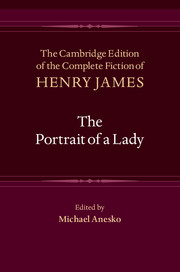Book contents
- Frontmatter
- Contents
- List of Illustrations
- Acknowledgments
- List of Abbreviations
- General Editors’ Preface
- General Chronology of James’s Life and Writings
- Introduction
- Textual Introduction
- Chronology of Composition and Production
- Bibliography
- The Portrait of a Lady
- Glossary of Foreign Words and Phrases
- Notes
- Textual Variants
- Emendations
- Appendices
Chapter 39
Published online by Cambridge University Press: 11 April 2021
- Frontmatter
- Contents
- List of Illustrations
- Acknowledgments
- List of Abbreviations
- General Editors’ Preface
- General Chronology of James’s Life and Writings
- Introduction
- Textual Introduction
- Chronology of Composition and Production
- Bibliography
- The Portrait of a Lady
- Glossary of Foreign Words and Phrases
- Notes
- Textual Variants
- Emendations
- Appendices
Summary
IT probably will not be surprising to the reflective reader that Ralph Touchett should have seen less of his cousin since her marriage than he had done before that event—an event of which he took such a view as could hardly prove a confirmation of intimacy. He had uttered his thought, as we know, and after this he had held his peace, Isabel not having invited him to resume a discussion which marked an era in their relations. That discussion had made a difference—the difference that he feared, rather than the one he hoped. It had not chilled the girl's zeal in carrying out her engagement, but it had come dangerously near to spoiling a friendship. No reference was ever again made between them to Ralph's opinion of Gilbert Osmond; and by surrounding this topic with a sacred silence, they managed to preserve a semblance of reciprocal frankness. But there was a difference, as Ralph often said to himself— there was a difference. She had not forgiven him, she never would forgive him; that was all he had gained. She thought she had forgiven him; she believed she didn't care; and as she was both very generous and very proud, these convictions represented a certain reality. But whether or no the event should justify him, he would virtually have done her a wrong, and the wrong was of the sort that women remember best. As Osmond's wife, she could never again be his friend. If in this character she should enjoy the felicity she expected, she would have nothing but contempt for the man who had attempted, in advance, to undermine a blessing so dear; and if on the other hand his warning should be justified, the vow she had taken that he should never know it, would lay upon her spirit a burden that would make her hate him. Such had been, during the year that followed his cousin's marriage, Ralph's rather dismal prevision of the future; and if his meditations appear morbid, we must remember that he was not in the bloom of health. He consoled himself as he might by behaving (as he deemed) beautifully, and was present at the ceremony by which Isabel was united to Mr. Osmond, and which was performed in Florence in the month of June.
- Type
- Chapter
- Information
- The Portrait of a Lady , pp. 375 - 386Publisher: Cambridge University PressPrint publication year: 2016

